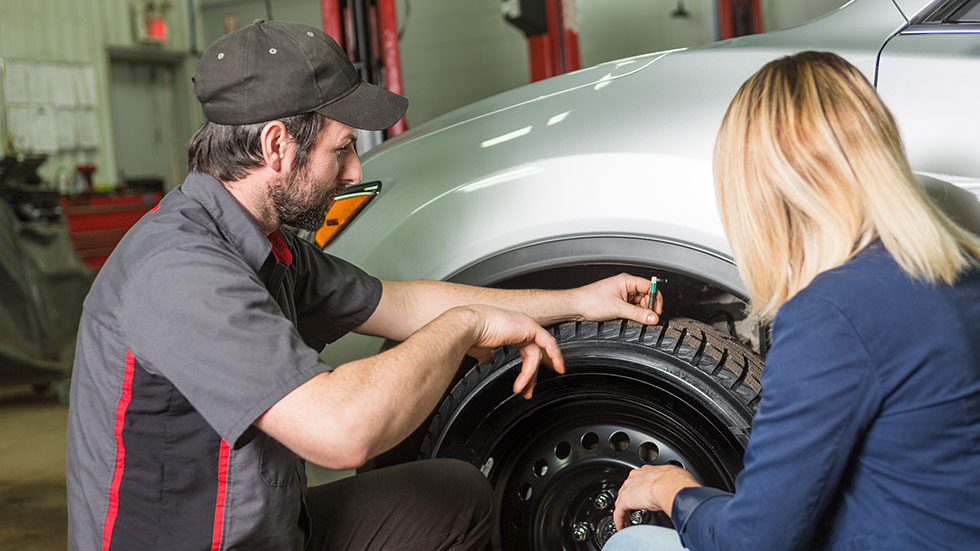Should You Be Concerned If Your Steering Wheel Shakes?
How to diagnose and take action


When it comes to the myriad issues drivers can experience with their vehicles, few are more disconcerting than a shaky steering wheel. Why is this happening? What does it mean? Should I pull over or is this a minor issue?
In this article, we will take a look at some common (as well as some not-so-common) mechanical issues that cause steering wheel shake in vehicles and what drivers can do to address them.

Warped brake rotors
If you are experiencing steering wheel shake as you brake to slow down or stop your vehicle, this could be an indicator of warped brake rotors. Brake rotors are the smooth, flat wheel discs that attach your wheel to the axle assembly and that brake calipers grip when you apply pressure to your brake pedal. As the calipers squeeze brake pads onto the spinning rotor to slow it, friction and heat are generated. With use over time, and depending on how aggressively you drive, this heat buildup can warp the rotors, which leads to steering wheel shake. Although you can continue to drive on warped rotors, you should take your car in for service as soon as possible. Driving on warped rotors can lead to premature wear on delicate suspension components or uneven tire wear.
Sticking brake caliper
Another reason you could be feeling steering wheel shake as you slow your vehicle is a stuck brake caliper. Although less common than warped rotors, calipers exposed to extreme amounts of dirt or debris buildup can latch onto your rotor and not let go. They can also be “grabby,” meaning they may suddenly apply pressure to your rotor even after you have taken your foot off the brake pedal. If you suspect a stuck caliper, you should see your mechanic as soon as possible as your vehicle may be unsafe to drive.

Flat spotted tires
Anti-lock brakes generally do an excellent job of preventing drivers from locking their wheels during abrupt stops, but the systems are not perfect. Flat spotted tires can be caused by skidding over asphalt, leading to a bumpy ride and shaky steering as the flat spot rolls along. Flat spots can also be caused if a vehicle sits parked in a stationary position for an extended period, warping the sidewalls and contact patch of the tire itself. Although not a critical issue, flat spotted tires can be annoying to drive on and over a long enough time, can lead to premature wear on other components.
Wheels out of balance
If you have ever experienced a washing machine with an uneven load on spin cycle, then you are no stranger to the vibration that can result when something is spinning quickly while it is out of balance. The same physics apply to improperly balanced tires. Wheels with uneven weight distribution can cause a wobble that turns into a vibration that is then felt in your steering wheel. You may only notice the steering wheel shake at highway driving speeds with the vibration subsiding as you slow down, but it depends on how out of balance your wheel is. If you suspect unbalanced tires, take your car in as soon as possible because continuing to drive on them will lead to premature wear and an expensive purchase of new tires.

Wheels out of alignment
Your vehicle’s suspension and steering assembly are finely tuned to keep your wheels running parallel to one another, meeting the asphalt evenly. As you accumulate miles over time and run over obstacles like potholes or bumps, your wheel alignment can be thrown out of whack. Skewed alignment can cause your steering wheel to shake and create an uneven wear scenario on your tires. As a rule of thumb, you should have your wheels aligned every 6,000 miles during a regular maintenance stop.
Worn suspension components
A very common cause of steering wheel shake is worn or broken suspension components. Over the course of thousands of miles of driving, it is natural for these components to wear, so many drivers notice suspension issues come to life gradually over time. It may start with an odd sound here or there, creaking noises, or even a difference in how your vehicle feels as it absorbs bumps in the road. Eventually, once the problem is bad enough, it can lead to steering wheel shake. Suspension issues should be looked at immediately because not only do they lead to uneven wear on all your steering assembly, but if they are bad enough, they can make your vehicle unsafe to drive.
If you are experiencing steering wheel shake, it’s time to take your car in for a repair.
